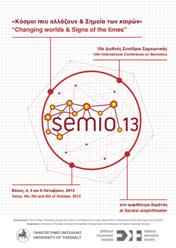Why semiotics?
Karin Bocklund – Lagopoulou
Aristotle University of Thessaloniki
Why talk about semiotics in 2013 in Greece? Why should a theory that developed out of Structuralism in the 1960s and 1970s hold any interest for us today, half a century later? Does semiotics still have something to teach us, does it offer us something that is still useful today?
In the 50 years since the publication of Roland Barthes’s slim volume Éléments de sémiologie, semiotics has become an autonomous scientific field. There are university courses in semiotics − there are even a few universities that offer degrees in semiotic studies. Journals and books are published with the word “semiotics” on the title page, though admittedly not very many.
As a methodology, however, semiotics has become an integral part of many scientific fields; indeed, one encounters semiotic methodology in nearly all of the traditional disciplines of the humanities and some not so traditional ones. Semiotics was from its conception interdisciplinary and has always questioned the boundaries between the human sciences. This interdisciplinarity is a legacy it has bequeathed to all the disciplines involved in the study of culture. Not only is semiotics applied as a method of analysis in these fields, but it also creates links between them: literature and art, anthropology and archaeology, education and visual culture, film and music.
But by far the most important quality of semiotics − perhaps today more important than ever before − is its effectiveness as a tool for the analysis of the ideological underpinnings that lie at the foundations of all cultural phenomena, from school textbooks to avant-garde art. By analysing all cultural phenomena as texts, semiotics can reveal how they are constructed, what codes they employ, how they weave them together to create the message that “this is how the world is, this is what human beings are, this is reality and this is how it has to be”. Even today, semiotics is the best tool we have for the critical deconstruction of ideological texts. Might that be the reason why it is supposed to be out of fashion?



